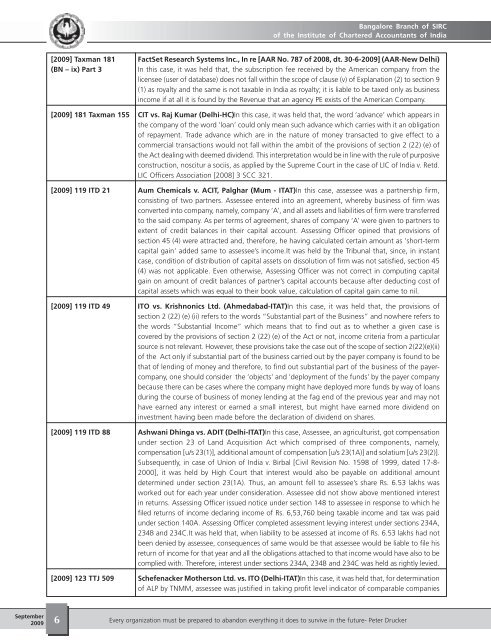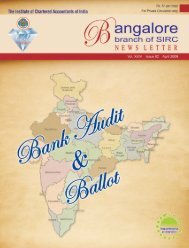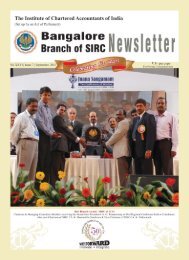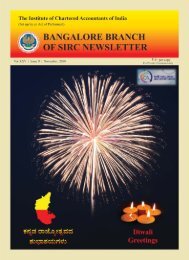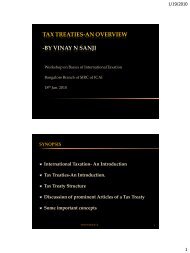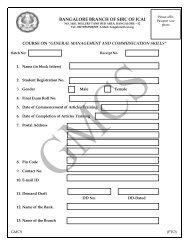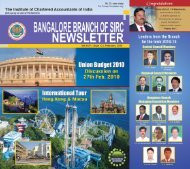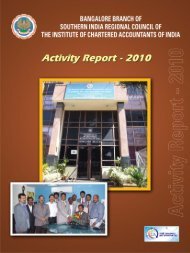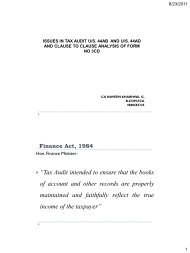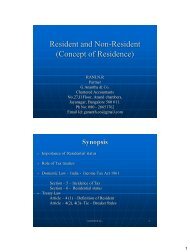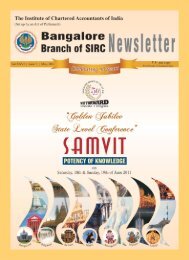Blore Br_Sept_09_Newsletter_email.pmd - Bangalore Branch of SIRC
Blore Br_Sept_09_Newsletter_email.pmd - Bangalore Branch of SIRC
Blore Br_Sept_09_Newsletter_email.pmd - Bangalore Branch of SIRC
- No tags were found...
You also want an ePaper? Increase the reach of your titles
YUMPU automatically turns print PDFs into web optimized ePapers that Google loves.
<strong>Bangalore</strong> <strong>Br</strong>anch <strong>of</strong> <strong>SIRC</strong><strong>of</strong> the Institute <strong>of</strong> Chartered Accountants <strong>of</strong> India[20<strong>09</strong>] Taxman 181 FactSet Research Systems Inc., In re [AAR No. 787 <strong>of</strong> 2008, dt. 30-6-20<strong>09</strong>] (AAR-New Delhi)(BN – ix) Part 3 In this case, it was held that, the subscription fee received by the American company from thelicensee (user <strong>of</strong> database) does not fall within the scope <strong>of</strong> clause (v) <strong>of</strong> Explanation (2) to section 9(1) as royalty and the same is not taxable in India as royalty; it is liable to be taxed only as businessincome if at all it is found by the Revenue that an agency PE exists <strong>of</strong> the American Company.[20<strong>09</strong>] 181 Taxman 155 CIT vs. Raj Kumar (Delhi-HC)In this case, it was held that, the word ‘advance’ which appears inthe company <strong>of</strong> the word ‘loan’ could only mean such advance which carries with it an obligation<strong>of</strong> repayment. Trade advance which are in the nature <strong>of</strong> money transacted to give effect to acommercial transactions would not fall within the ambit <strong>of</strong> the provisions <strong>of</strong> section 2 (22) (e) <strong>of</strong>the Act dealing with deemed dividend. This interpretation would be in line with the rule <strong>of</strong> purposiveconstruction, noscitur a sociis, as applied by the Supreme Court in the case <strong>of</strong> LIC <strong>of</strong> India v. Retd.LIC Officers Association [2008] 3 SCC 321.[20<strong>09</strong>] 119 ITD 21 Aum Chemicals v. ACIT, Palghar (Mum - ITAT)In this case, assessee was a partnership firm,consisting <strong>of</strong> two partners. Assessee entered into an agreement, whereby business <strong>of</strong> firm wasconverted into company, namely, company ‘A’, and all assets and liabilities <strong>of</strong> firm were transferredto the said company. As per terms <strong>of</strong> agreement, shares <strong>of</strong> company ‘A’ were given to partners toextent <strong>of</strong> credit balances in their capital account. Assessing Officer opined that provisions <strong>of</strong>section 45 (4) were attracted and, therefore, he having calculated certain amount as ‘short-termcapital gain’ added same to assessee’s income.It was held by the Tribunal that, since, in instantcase, condition <strong>of</strong> distribution <strong>of</strong> capital assets on dissolution <strong>of</strong> firm was not satisfied, section 45(4) was not applicable. Even otherwise, Assessing Officer was not correct in computing capitalgain on amount <strong>of</strong> credit balances <strong>of</strong> partner’s capital accounts because after deducting cost <strong>of</strong>capital assets which was equal to their book value, calculation <strong>of</strong> capital gain came to nil.[20<strong>09</strong>] 119 ITD 49 ITO vs. Krishnonics Ltd. (Ahmedabad-ITAT)In this case, it was held that, the provisions <strong>of</strong>section 2 (22) (e) (ii) refers to the words “Substantial part <strong>of</strong> the Business” and nowhere refers tothe words “Substantial Income” which means that to find out as to whether a given case iscovered by the provisions <strong>of</strong> section 2 (22) (e) <strong>of</strong> the Act or not, income criteria from a particularsource is not relevant. However, these provisions take the case out <strong>of</strong> the scope <strong>of</strong> section 2(22)(e)(ii)<strong>of</strong> the Act only if substantial part <strong>of</strong> the business carried out by the payer company is found to bethat <strong>of</strong> lending <strong>of</strong> money and therefore, to find out substantial part <strong>of</strong> the business <strong>of</strong> the payercompany,one should consider the ‘objects’ and ‘deployment <strong>of</strong> the funds’ by the payer companybecause there can be cases where the company might have deployed more funds by way <strong>of</strong> loansduring the course <strong>of</strong> business <strong>of</strong> money lending at the fag end <strong>of</strong> the previous year and may nothave earned any interest or earned a small interest, but might have earned more dividend oninvestment having been made before the declaration <strong>of</strong> dividend on shares.[20<strong>09</strong>] 119 ITD 88 Ashwani Dhinga vs. ADIT (Delhi-ITAT)In this case, Assessee, an agriculturist, got compensationunder section 23 <strong>of</strong> Land Acquisition Act which comprised <strong>of</strong> three components, namely,compensation [u/s 23(1)], additional amount <strong>of</strong> compensation [u/s 23(1A)] and solatium [u/s 23(2)].Subsequently, in case <strong>of</strong> Union <strong>of</strong> India v. Birbal [Civil Revision No. 1598 <strong>of</strong> 1999, dated 17-8-2000], it was held by High Court that interest would also be payable on additional amountdetermined under section 23(1A). Thus, an amount fell to assessee’s share Rs. 6.53 lakhs wasworked out for each year under consideration. Assessee did not show above mentioned interestin returns. Assessing Officer issued notice under section 148 to assessee in response to which hefiled returns <strong>of</strong> income declaring income <strong>of</strong> Rs. 6,53,760 being taxable income and tax was paidunder section 140A. Assessing Officer completed assessment levying interest under sections 234A,234B and 234C.It was held that, when liability to be assessed at income <strong>of</strong> Rs. 6.53 lakhs had notbeen denied by assessee, consequences <strong>of</strong> same would be that assessee would be liable to file hisreturn <strong>of</strong> income for that year and all the obligations attached to that income would have also to becomplied with. Therefore, interest under sections 234A, 234B and 234C was held as rightly levied.[20<strong>09</strong>] 123 TTJ 5<strong>09</strong> Schefenacker Motherson Ltd. vs. ITO (Delhi-ITAT)In this case, it was held that, for determination<strong>of</strong> ALP by TNMM, assessee was justified in taking pr<strong>of</strong>it level indicator <strong>of</strong> comparable companies<strong>Sept</strong>ember20<strong>09</strong>6Every organization must be prepared to abandon everything it does to survive in the future- Peter Drucker


